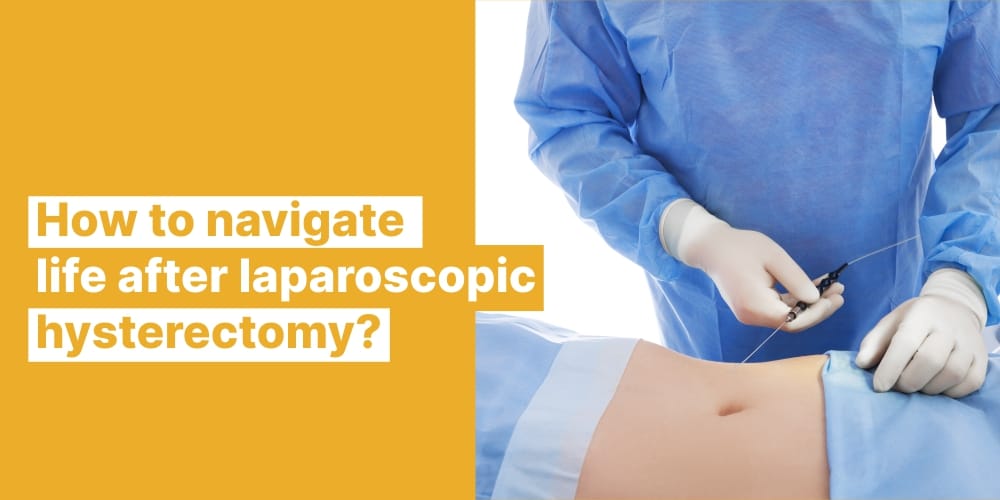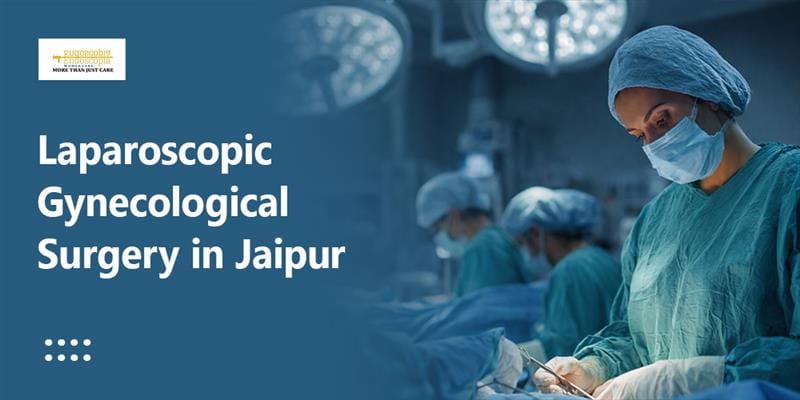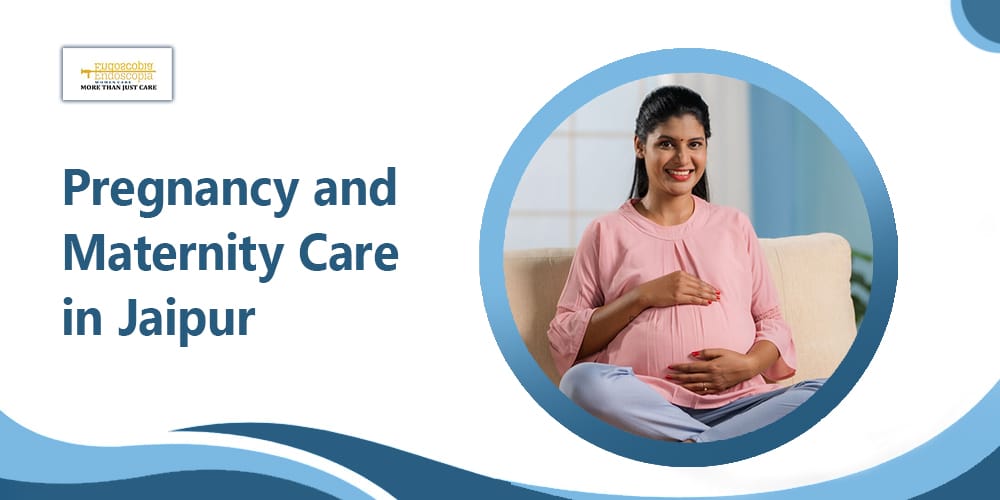As a gynecologist, I have met many women struggling with a serious decision about their health: whether to have hysterectomy or not. The thought of getting the uterus removed is worrisome,
and the traditional process is painful. Women, who often have to juggle several tasks often shy away from the traditional hysterectomy because of its lengthy recovery time. However, things have changed, and now laparoscopic hysterectomy is the better alternative.
Why you might need a laparoscopic hysterectomy?
A hysterectomy is when we surgically remove your uterus (womb). We consider this step when other treatments haven’t worked:
- Uterine Fibroids: These are common, non-cancerous growths that can cause really heavy bleeding, ongoing pain in your lower belly, or a feeling of pressure.
- Endometriosis: This is when tissue similar to your womb’s lining grows outside your womb, causing severe pain, especially during your periods.
- Adenomyosis: Similar to endometriosis, but here, the lining grows into the muscle wall of your womb, leading to very heavy and painful periods.
- Persistent Pelvic Pain: When you have constant pain in your lower belly that affects your daily life and nothing else seems to help.
- Heavy, Irregular Bleeding: If your periods are very heavy or don’t stop, disrupting your life, and medicines aren’t helping.
- Womb Prolapse: When your womb sags down into your vagina.
- Certain Cancers: Like cancers of the womb, cervix, or sometimes the ovaries.
In the past, to do this surgery, we’d make a large cut across your tummy, like for a C-section. This “open” surgery worked, but it meant a lot of pain, a longer stay in the hospital, and a recovery that felt like forever.
But with laparoscopic hysterectomy, we put in a thin tube with a tiny camera to see your insides clearly on a big screen. Then, through the other small cuts, we use special tiny tools to do the surgery. Once the womb is detached, we gently remove it through one of these small cuts or through the vagina.
Reasons for choosing laparoscopic hysterectomy surgery
Much Less Pain: This is the first thing my patients tell me they appreciate. Smaller cuts mean much less pain after the surgery. You’ll need fewer painkillers and feel comfortable much sooner.
Tiny Scars: Those small incisions heal into tiny, often barely visible marks. This isn’t just cosmetic; it can genuinely boost a woman’s self-confidence and body image.
Fewer Problems, More Safety: Because the cuts are so small and we can see everything so clearly, there’s less risk of issues that can happen with bigger surgeries:
- Less Chance of Infection
- Less Blood Loss
- Fewer Internal Scars
Super Precise Surgery: That magnified, clear view on the screen helps me operate with incredible accuracy. It means less risk of accidentally harming nearby organs like your bladder or bowel.
Keeping Your Ovaries (If We Can): If your ovaries are healthy and not part of the problem, we can often leave them in place during the surgery. This helps keep your hormones balanced if you haven’t reached menopause yet.
Is Laparoscopic Hysterectomy Surgery Truly Safe?
Let’s talk about it!
It’s natural to ask, “Is keyhole surgery safe?” With all my experience, it is very safe when done by a surgeon who is highly skilled and experienced. Every surgery has some risks, but with an expert hand, laparoscopic techniques are incredibly safe and often lead to better overall outcomes than the older, open methods.
Understanding the Cost of Laparoscopic Hysterectomy
While the cost can vary, it’s good to know that laparoscopic hysterectomy is often comparable to, or sometimes even more affordable than, open surgery, especially when you think about spending less time in the hospital and getting back on your feet faster.
- Hospital Choice: Bigger, more modern private hospitals might have higher charges.
- Surgeon’s Experience: A highly experienced and well-known laparoscopic surgeon might have higher fees.
- City/Location: Prices can differ quite a bit between big cities and smaller towns.
- Type of Hysterectomy: Whether we remove just the womb, or the womb and cervix, or if other things are done at the same time.
- Before and After Care: This includes your initial tests, consultations, and follow-up visits.
- Any Unexpected Issues: While rare, if there are any complications during or after surgery, the cost might go up.
Answering your questions about laparoscopic hysterectomy
“Will it affect my intimate life?”
For many women, their intimate life actually improves after a hysterectomy! If you’ve been living with chronic pain, heavy bleeding, or discomfort, removing the source of these issues can bring immense relief and renewed confidence. We always discuss how to ensure a comfortable return to all aspects of your life after healing.
“Will I regret this decision?”
My experience shows that the vast majority of women feel profound relief after a hysterectomy, especially when it resolves long-standing, debilitating symptoms. It’s often a path to a healthier, more comfortable future.
What to expect while recovering from laparoscopic hysterectomy
- Hospital Stay: Most of my patients typically go home within 1-2 days.
- Pain: You’ll feel some discomfort where the small cuts were made, and sometimes a bit of shoulder pain from the gas used during surgery. This is easily managed with medicines I’ll prescribe.
- Vaginal Bleeding: It’s normal to have some light bleeding or spotting for a week or two. Please use sanitary pads, not tampons, to prevent infection.
- Eating: A healthy diet with plenty of fiber and water is key to prevent constipation, which can be common after surgery.
- Hygiene: You can shower normally. Just avoid baths until I give you the okay (usually 6-8 weeks).
- Intimacy: Most women are advised to wait 6-8 weeks before resuming sexual activity to allow everything to heal properly inside.
- Back to Work: Depending on what you do, you might be back to work in 2-3 weeks. If your job involves a lot of physical activity, you might need a bit longer.
Having a hysterectomy is a big change, but it doesn’t change who you are as a woman. For many, it brings incredible relief from painful symptoms, leading to a much better quality of life.
- Periods: If your womb is removed, you will no longer have periods.
- Menopause: If your ovaries are also removed, you will go into menopause right away. We’ll talk about options like hormone therapy if needed. If your ovaries stay, you won’t experience immediate menopause.
- Sex Life: Many women find their sex life actually improves after a hysterectomy, especially if chronic pain or heavy bleeding was an issue before.
- Emotions: It’s completely normal to feel a range of emotions after a hysterectomy. Talking with your doctor, family, and friends can be really helpful.
Laparoscopic hysterectomy truly is a wonderful advancement in women’s health. It offers a path to healing that truly cares about your comfort, getting you back to your life quickly, and causing minimal disruption. It’s about giving you back your freedom and helping you live a healthier, happier life. If you’re thinking about a hysterectomy, please consider the benefits of this laparoscopic approach.
Will I gain weight after a hysterectomy?
A hysterectomy itself (removing only the uterus) does not directly cause weight gain. However, if your ovaries are also removed, leading to surgical menopause, hormonal changes might make it slightly harder to maintain weight.
Will I go into menopause if I have a hysterectomy?
If your ovaries are healthy and not removed during the surgery, you will not go into menopause right away. Your ovaries will continue to produce hormones until you naturally reach menopause. If your ovaries are removed along with the uterus, you will experience surgical menopause immediately.
Are there other options besides hysterectomy for my condition?
Before recommending a hysterectomy, we thoroughly explore all other possible treatments for your specific condition, such as medications, hormonal therapies, or other minimally invasive procedures. Hysterectomy is usually considered when these options haven’t provided enough relief.
How soon can I travel or resume normal activities like driving?
Generally, I advise against long-distance travel for about 2-4 weeks after laparoscopic hysterectomy. You can usually resume driving once you are no longer taking strong pain medication and feel comfortable making sudden movements, typically within 1-2 weeks. Always listen to your body and my specific advice for you.
What is the difference between a total and a partial hysterectomy?
A total hysterectomy involves removing both the uterus and the cervix (the lower part of the uterus that connects to the vagina). A partial (or subtotal) hysterectomy involves removing only the upper part of the uterus, leaving the cervix intact. The best type for you depends on your specific health condition and needs, which we will discuss in detail.







One Response